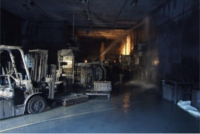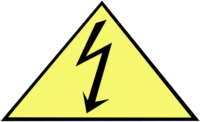 The company responsible for the chemical spill that caused the loss of water service to thousands of West Virginia residents is the target of 18 lawsuits – so far – and a temporary restraining order that prohibits it from destroying or removing evidence from its facility.
The company responsible for the chemical spill that caused the loss of water service to thousands of West Virginia residents is the target of 18 lawsuits – so far – and a temporary restraining order that prohibits it from destroying or removing evidence from its facility.
Chemical company Freedom Industries on Thursday leaked thousands of gallons of 4-ethylcyclohexanemethanol from one of its storage tanks at its facility on the Elk River. The spill occurred just upriver from the water company’s intake.
Thousands left without drinking water
An estimated 300,000 residents were placed under a “do not use” order and forced to wait in long lines for drinking water to be distributed by the Federal Emergency Management Agency, after President Obama issued a state of emergency declaration for the nine-county Charleston area. As of yesterday, tests of drinking water had resulted in the order being lifted for about 1/3 of those affected; the rest are still waiting.
The judicial order prevents Freedom Industries from modifying any “structure, tank, equipment, material or condition of" its facility with the exception of changes necessary for stopping and cleaning up the chemical spill.
The company is also required to keep documents relating to other chemical spills at its facilities; chemical storage policies; policies and procedures and any communications between it and West Virginia American Water from Jan. 8 on.
Sent guests packing
Businesses forced to shut down when by the loss of water service – including hotels who had to send their guests packing – are behind most of the lawsuits that have been filed against Freedom Industries. Schools were also forced to close.
U.S. Attorney Booth Goodwin has launched an investigation into the leak.
"If our investigation reveals that federal criminal laws were violated, we will move rapidly to hold the wrongdoers accountable,” said Goodwin. “Our drinking water is not something you can take chances with, and this mess can never be allowed to happen again."
The National Council for Occupational Safety and Health pointed out that the West Virginia incident bore some similarities to last year’s disaster at the West Fertilizer Co. in West, Texas.
Emergency responders didn't know about hazardous chemicals at site
“Like the West, Texas, catastrophe, Freedom Industries in West Virginia failed to implement emergency plans," said executive director Tom O'Connor. "The1986 Superfund reauthorization law (SARA Title III) requires companies to report information about the types and amounts of chemicals stored at a given facility. As was the case in the West incident, neither the community nor emergency responders were aware of the quantity of potentially hazardous chemicals at the site.”
The owners of chemical facilities across the country should take this opportunity to develop safety plans so they are better prepared in the event that something should happen at their own facilities.”
The group also pointed out that the U.S. Chemical Safety Board (CSB) has recommended that state and local governments create new, stricter chemical safety programs such as the one used in Contra Costa, Calif., in which companies are required to submit safety plans, which then are reviewed by local government agencies.
Falling on deaf ears
Despite an August, 2008 explosion and fire that killed two workers in Charleston, the state failed to implement a more stringent chemical safety program.
“Under the statute governing the CSB, the agency has no enforcement ability, so its recommendations often fall on deaf ears.”
An Executive Order issued last summer by President Barack Obama’s Executive Order on Improving Chemical Facility Safety and Security – issued last summer in the wake of the West, Texas, disaster – was designed to address gaps in oversight similar to those present in West Virginia. But because of delays caused by the government shutdown, federal agencies have not yet shared their progress in addressing chemical safety.

